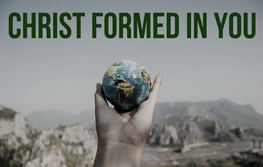 If you caught this yesterday, my sermon text for Sunday is Galatians 4:8-20. A text that reveals Paul’s heart for the Galatian house churches and his perplexity (v. 20) over why the Gentile Galatians would even consider adopting—even more so, getting circumcised and identifying with--the Law and, thus, old age, living in exile, under the covenant curse Israel current position before God? Breaks his heart (as this text reveals). In this section, Paul also tells the Galatian house churches what his goal is. This is found in verse: “my little children, for whom I am again in the anguish of childbirth until Christ is formed in you!” (V. 19). Most English readers take the “you” as “you individuality,” assuming Paul means “I desire to see each Christian looking like, acting like Jesus.” While this is a good thing of course—and would be if that’s what Paul meant here. But it begs the question: What does looking like and acting like Jesus look like? And, is Paul referring to the individual Christian? Here in this text, not only is the “you” plural, it is a part of a prepositional phrase: ἐν ὑμῖν (“among you,” i.e., among you, the house churches in Galatia). So, Paul is saying, “My little children [those whom I led to Christian among the house churches in Galatia], for whom I am again in the anguish of childbirth until Messiah is formed among you.” It is so much more preferable to take the “in” (of most English translations] as “among,” a perfectly reasonable rendering of what Paul wrote. Now we should ask what does Paul mean by formed “among” the house churches in Galatia? The apostle has already told us in chapter 3. “For as many of you as were baptized into Christ have put on Christ. There is neither Jew nor Greek, there is neither slave nor free, there is no male and female, for you are all one in Christ Jesus” (vv. 27-28). Since the Law has fulfilled its purpose (which is why it was temporary and why it is so perplexing you--Galatian, Gentile Christians--would even consider circumcising yourselves to this Law), additionally, you all have been baptized into Christ, listen, and now there is neither Jew nor Gentile; there is neither slave nor free; there is neither male nor female—you all are in Christ and you all are Abraham’s offspring, heirs according to the promise [given to Abraham].” This is what is means to have Christ formed among them, namely churches that present “neither Jew nor Greek, there is neither slave nor free, there is no male and female” (3:28); house churches where “you are all one in Christ Jesus” (v. 28d). This observation makes me think that when our churches are majority peer-like congregations, I wonder if we are then returning to the elementary principles that govern the world—or, as Paul says in our text, we have returned to idol-worship.
0 Comments
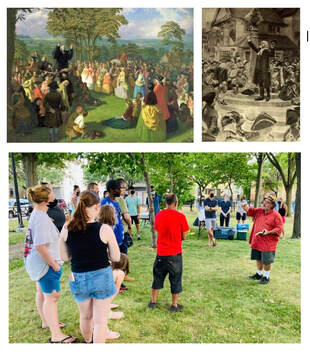 John Wesley's Journal, March 31, 1739: “In the evening I reached Bristol, and met Mr. Whitefield there. I could scarce reconcile myself at first to this strange way of preaching in the fields, of which he set me an example on Sunday; having been all my life (till very lately) so tenacious of every point relating to decency and order, that I should have thought the saving of souls almost a sin, if it had not been done in a church.” Because Anglican Church leadership had forbidden and barred their churches from allowing George Whitefield from preaching in their pulpits, he, then instead, took to the open air to preach. On February 17, 1739, Whitefield preached, for the first time, in the open air to about two hundred coal miners at Kingswood (near Bristol, England). Within three weeks, thousands began crowding to listen to Whitefield’s preaching. Soon, he called on John Wesley to come help him in this open air preaching. Though Paul and other New Testament figures took to the open air with the message of the gospel, Whitefield and Wesley (re)discovered (if you will) in these (as one author put it) “unsettled conditions,” open air preaching among “the neglected Kingswood colliers” (coal miners).
Soon even John Wesley was refused access to Anglican pulpits. Yet, that did not stop Wesley from preaching the gospel: On one occasion, because he was blocked from a pulpit in Epworth, his father buried just outside that church, Wesley famously stood on his father's grave and began to preach. Many came to listen. Whitefield and Wesley reached the “neglected” multitudes among us (which I call the “forgotten elect”*) with their open air preaching. And, none can say these outdoor masses weren’t discipled to mature their faith, for much of our present day discipleship is borrowed and built on Whitefield and Wesley’s “methods.” Now mind you, I am no John Wesley nor George Whitefield, and I haven't been banned from any pulpits (that I know of anyway) and, as far as I can tell, I am in good standing with my denomination, but yet, still, almost everyone who stands in front of me at our Summer "In His Midst" Park BBQs or on the sidewalk each Saturday does not attend church—so, for them it is moot why I preach outdoors, this is the only Gospel, the only church, the only pastoral care, and for some the only discipleship they are going to ever get. They are the neglected among us that regular, ordinary pulpits are not going to reach—by design, default, habit, or ignorance, it matters not. We cannot do ordinary church in a place where there are so many, what I call, the forgotten elect. No matter which theological background you come from, most of these good sinners will never enter a church building until it is too late. So, the Hill is my parish. Yes, there will be distractions and required other duties, but while God gives me breath and enables, I will seek to preach and reach these forgotten elect. *In this way, I am a little more Whitefield than Wesley, I get that.  Here's the rub: it's not just simply believing in your heart that God raised Jesus from the dead and confessing that Jesus is Lord, but with whom you are believing and confessing together with that matters. There is a remarkable interchange between Aslan and one of the children getting ready to embark on a dangerous, yet important journey. In C.S. Lewis’ The Silver Chair, Aslan, the Christ-like figure in the story, is speaking rather seriously to Jill. It was important, crucial for her to remember these signs that will guide her on her perilous quest to rescue the Prince Rilian. She must cling to Aslan’s words and follow the signs that he gave her: . . . first, remember, remember, remember the signs. Say them to yourself when you wake in the morning and when you lie down at night, and when you wake in the middle of the night. And whatever strange things may happen to you, let nothing turn your mind from following the signs. And secondly, I give you a warning. Here on the mountain I have spoken to you clearly: I will not often do so down in Narnia. Here on the mountain, the air is clear and your mind is clear; as you drop down into Narnia, the air will thicken. Take great care that it does not confuse your mind. And the signs which you have learned here will not look at all as you expect them to look, when you meet them there. That is why it is so important to know them by heart and pay no attention to appearances. Remember the signs and believe the signs. Nothing else matters. Remember the signs. True, our text, Romans 10:5-13, is not explicitly about signs . . . but it is, actually, in the two marks of faith, signs if you will, that are given: believing and confessing. Signs that signify! My parallel in using Aslan’s words to Jill in Lewis’ The Silver Chair also isn’t apparent . . . so let me explain before we get to the text itself. First, believing and confessing are indeed the marks (signs) of a believing community and these signs are true and should be true of the house-churches in Rome:
These are the two signs—they are clear on the mountain top (that is, in theology and, perhaps, in our belief systems), but they won’t be so clear in the thick air of the valley (in the mundane and crises of life). The two signs: believing God raised Jesus from the dead and confessing that Jesus is Lord. Sounds so easy. So simple. Especially while we are living and breathing in a nation and within a place and time when church seems so normal, ordinary, and natural, and pretty easily defined. But, actually, not so much. Certainly not so easy in that first setting, the city capital of the world, Rome. Believing that God raised that traitor—that man who was crucified on that Roman cross. Being raised from the dead was incredibly naïve and ridiculously dangerous in an Empire where people stayed dead once they were declared guilty of treason and put to open shame on a Roman cross. And, confessing this One raised from the dead—confessing out-loud, in public setting like a supper, in the lifting of that fourth cup at that supper meal—that Jesus is Lord is not only scandalous, it was treason against Caesar (for he was to be confessed as Lord). This believing and confessing was dangerous—and if you didn’t see this and hear this believing and confessing happening, well, it wasn’t church. It wasn’t a church at all. This is one certain place where the Christian life cannot, biblically, be lived apart from a local, concrete, embodied group of believers--a church. A “confessing” Christian simply cannot confess apart from others, others who are seated around that table. In fact, there is no believing without confessing and there is no confessing without being a part of a local, concrete body of believers--a local gathering, a church. We are believing, not as individuals, not as disembodied, church-less Christians, but as confessing Christians, together confessing that Jesus is Lord . . . and who is around this table, that is, who is supposed to be around that table? Paul's list: the elite-Greek, Barbarian, Jew, the educated and the uneducated . . . this is Paul’s point to the house-churches in Rome (cf. Romans 1:14-15)—this is Paul’s point to us in Romans 10:9-13: because, if you confess with your mouth that Jesus is Lord and believe in your heart that God raised him from the dead, you will be saved. For with the heart one believes and is justified, and with the mouth one confesses and is saved. For the Scripture says, “Everyone who believes in him will not be put to shame.” For there is no distinction between Jew and Greek; for the same Lord is Lord of all, bestowing his riches on all who call on him. For “everyone who calls on the name of the Lord will be saved.” Why is there no distinction between Jew and Greek? Why is there no distinction between the Jew and the elite-Greek, the barbarian, the educated and the uneducated (cf. Romans 1:14), because God’s solution to our sin is not out of reach for anyone. Why is it found in our believing that God raised Jesus from the dead and by us confessing that Jesus is Lord . . . why? . . . because “everyone who calls on the name of the Lord will be saved.” Everyone—the elite-Greek, barbarian, Jew, the educated and uneducated. (Feel free to translate that string into today’s population, social, and cultural, dividing, and separated demographics.) While we often use this text—and the next regarding sending preachers (10:14ff.)—as “witnessing” texts, evangelizing texts, they are not used in this way here in Romans 10 nor are they used for the house-churches in Rome to evangelize; but to help promote unity among the house-churches in Rome . . . how so? First, the unwelcomeness (Romans 14-15) among the house-churches in Rome between classes of people (social and cultural), it disavowed, negated what Paul has written about, namely, that “everyone who calls on the name of the Lord will be saved” We, too often, gather in worship together like NOT EVERYONE who calls upon the name of the Lord will be saved . . . it looks like, in our gathering as church, in our supper-room, around the table, that only “our kind,” only our friends and peers, only those in our political party, only those we’d want our children to marry, only those on this side of the rail-road tracks (as it were), this side of town . . . only these are the “who call upon the name of the Lord who will be saved.” This is the context and purpose of Romans, and is a fair and appropriate reading of the significance of Paul’s words concerning “believing” and “confessing.” The early church would not have had to fence the table and, in fact, we do not see them doing that amid the New Testament testimony. Strangely, most of the supper-rooms where the first Christians gathered would have been public or at least semi-public where outsiders could see and hear what was happening, and see who was sitting next to whom . . . and, thus, to participate in the Lord’s supper, surrounded at that table by fellow-Jesus-followers from differing classes, genders, age groups, slaves and masters, even children would have been crazy unless one actually believed that God raised Jesus from the dead; for you were confessing with these strangers and unequals that Jesus, not Caesar, was Lord. This crazy mixed company of peoples, believing and confessing together was the sign that it was all true—the gospel and the church were all true.
 Sometimes chapter divisions can detour from hearing what the author of a biblical text has said. This is so true of 1 Corinthians 13. Most, at least from all the sermons I have heard and the weddings I have attended attest. Nonetheless, chapter 12 and chapter 13 of 1 Corinthians are in need of being heard together as if there is no chapter division between them. In fact, there is a bookend link between 12:13 and 13:13: ζηλοῦτε δὲ τὰ χαρίσματα τὰ μείζονα (12:31a) μείζων δὲ τούτων ἡ ἀγάπη (13:13b) Even those who don’t know New Testament Greek can see it––you can see the word “greater” (μείζονα, 12:31a / μείζων, 13:13b) at the close of chapter 12 and the close of chapter 13. Different endings (like Spanish), of course, but the same word: μέγας (great/greater) in 12:31a and 13:13b. The NASB, as do other translations, offers what I think is a much better read than the ESV: “But earnestly desire the greater gifts” (12:31a, NASB) Don’t know why the ESV translates the word μέγας as “higher.” I suppose it could, but this doesn’t help the English reader. The mistranslation masks the bookends here, which, in turn, masks the dynamic relationship between 1 Corinthians 12 and 13–these two chapters need to be read as one. So you can see (and hear) what Paul has crafted (with my more word for word translation):
So what does this do for us as we read chapters 12 and 13 together? First, we take and read the two as one thread and not separate chapter 13 as if it is a stand-alone-text about the vague notion of “love.” Witnessed by the mistaken use of the “Love Chapter” during weddings. Chapter 12 is most certainly about church, so for Paul, chapter 13 is about church as well. Second, we just had a chapter (12) on the one body of Christ—and please understand Paul is specifically referring to local churches, meeting in someone’s home, thus, “To the church of God that is in Corinth,” 1:2a): one body, many members (cf. 12:12, 27). Paul begins with the spiritual gifts (12:1), to which he will return in chapter 14, but makes a turn toward people-related gifting at the end of our chapter 12: apostles, prophets, teachers, those that do miraculous gifts of healing, helping, administering, and of course tongues.
Yep. Everyone wants these powerful, status-granting, attention-centered spiritual gifts (let’s be honest). Thus, the need for chapter 13. So, Paul asks,
Yet, he says there is a better way, a more excellent way. Paul then concludes our chapter 12:
Then, Paul instructs his readers/listeners on this more excellent way:
Let’s read 12:27–13:3 as one thread, of course with my interpretative spin (but I think it’s there in Paul’s meaning, a fair reading):
Well, this is a radical thing we have going on here. A new community built on the Love, not status, education, bloodlines, abilities, usefulness, or even spiritual office or gifting. And, then the reader/listener has Paul’s final charge: “So now faith, hope, and love abide, these three; but the greatest of these is love” (13:13).
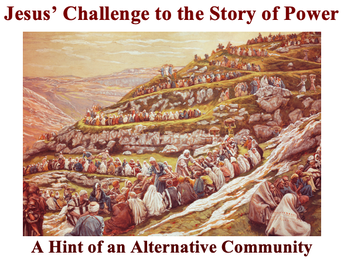 Matthew 14 (Sunday service, 5/12/19) Matthew 14 (Sunday service, 5/12/19) I’m doing some study on Matthew 14 this afternoon and ran across a rather powerful quote from Stanley Hauerwas’s commentary on Matthew. I have been thinking these thoughts for a while now (and I will be sharing some of them this coming (5/12/19) Sunday), namely, that those in power and the powerful must use power to stay in power; sadly, most use of power by the powers and the powerful is threat, violence, or the subtle making of promises to those without power (to grant or take away) something needed. It is this last use of power that is most deceptive and, well, rather powerful. You see, it matters not whether the powers or the powerful actually deliver on said promises, for it is the making of the promises that counts because those with no power have no choice but to acknowledge (bow before, vote for, smile in adoration, applaud or laud, promote, et al.) that it is only in the powers and powerful that they will ever see the good for themselves or their neighborhoods (even though they don’t ever see the promises delivered). In Matthew 14, Jesus (that is, Matthew in the narrative) is hinting at an alternative to power, first in Jesus as that alternative and then at the development (forthcoming, i.e., the forming of the) community that follows Jesus. We, the church (read a local church), are that alternative to the story of power. Here’s the quote:
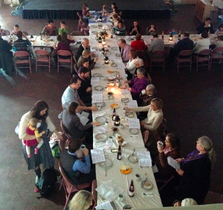 “Those who love their dream of a Christian community more than they love the Christian community itself become destroyers of that Christian community even though their personal intentions may be ever so honest, earnest and sacrificial. “God hates this wishful dreaming because it makes the dreamer proud and pretentious. Those who dream of this idolized community demand that it be fulfilled by God, by others and by themselves. They enter the community of Christians with their demands set up by their own law, and judge one another and God accordingly. “It is not we who build. Christ builds the church. Whoever is mindful to build the church is surely well on the way to destroying it, for he will build a temple to idols without wishing or knowing it. We must confess he builds. We must proclaim, he builds. We must pray to him, and he will build. We do not know his plan. We cannot see whether he is building or pulling down. It may be that the times which by human standards are the times of collapse are for him the great times of construction. It may be that the times which from a human point are great times for the church are times when it's pulled down. “It is a great comfort which Jesus gives to his church. You confess, preach, bear witness to me, and I alone will build where it pleases me. Do not meddle in what is not your providence. Do what is given to you, and do it well, and you will have done enough . . . Live together in the forgiveness of your sins. Forgive each other every day from the bottom of your hearts.” ~Dietrich Bonhoeffer, Life Together (pp. 10–11)  We’ve become mighty comfortable with the emperor giving us the power to be the church. Now, we do church and think and behave in ways that depend on the emperor’s power for forcing the rest of society to act like the church. In some ways, Flavius Valerius Constantinus is still on the throne of the church; and, we trust him to grant us our protection; we lobby him to force the rest of society to act as Christians (or face legal and, sometimes, brutal consequences); and we are thankful that he lets us constitute and gather as a special rights group of citizens of the empire. The church has given up the only power for leverage and change it has at its disposal, that is the cross, and has exchanged it for a share in the power of the emperor to bring about the moral, political, and social vision we deem Christian or politically correct (aka a left or right leaning political vision) . . . by law and, if need be, by force. We are willfully earthly, doing what many seek, exchanging one power (theirs) simply for another power (ours)–and the State to enforce our power. [Yea, like the Empire will be our friends. Not.] The church has given up on the only means of displaying the power of the cross, that is, through the gathering of the saints in fellowships, which has to work hard at unity (because it is an alien unity, wholly different than anything else known in the realms of humankind), whose congregants are neither female or male, slave or free, Jew or Gentile. The church (again, the local church) has ceased to be a wholly other kind of social body with a wholly other power and a wholly other way of leverage that changes and transforms society (and our neighborhoods); and, a reliance on something wholly other to see God’s kingdom impact social relationships and structures. We prefer Constantine’s power rather than our call to be people crucified with Christ, humbly meeting together, sharing a common meal, and welcoming all who would come and seek Messiah Jesus. We are no longer wholly other. We must find a better, more wholly different way. We, the church, need to be wholly different.
|
AuthorChip M. Anderson, advocate for biblical social action; pastor of an urban church plant in the Hill neighborhood of New Haven, CT; husband, father, author, former Greek & NT professor; and, 19 years involved with social action. Archives
February 2024
Categories
All
|
Pages |
More Pages |
|
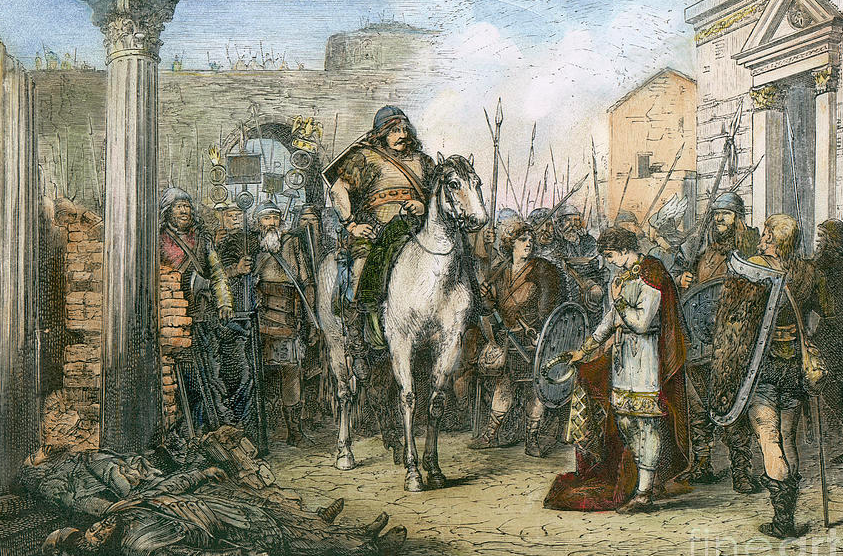
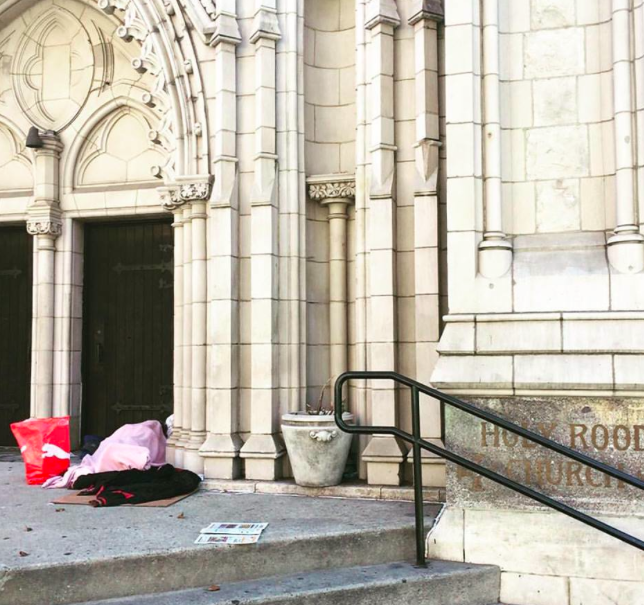
 RSS Feed
RSS Feed